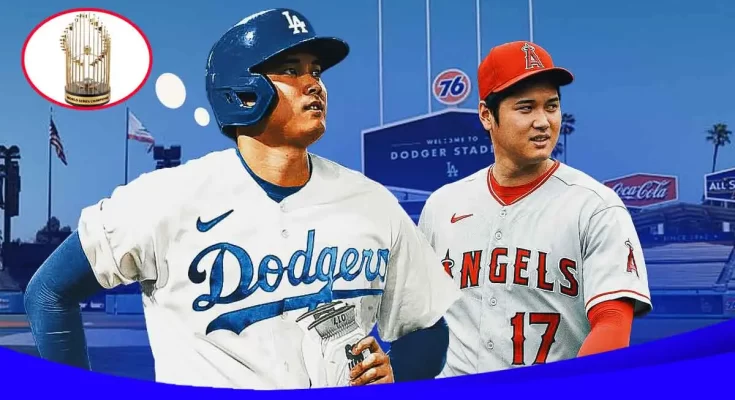The Truth Behind Shohei Ohtani’s Departure: His Growing Frustration with the Angels and the Bold Move to the Dodgers
Shohei Ohtani’s decision to leave the Los Angeles Angels and sign with the Los Angeles Dodgers was not just one of the biggest free-agent stories in recent baseball history—it was a seismic shift that sent shockwaves throughout Major League Baseball. To many fans and analysts, the move seemed inevitable given the Angels’ inability to build a competitive team around one of the greatest talents the sport has ever seen. However, the truth behind Ohtani’s departure is much deeper than just chasing titles or joining a larger market. It is a story of mounting frustration, unfulfilled promises, and an undeniable desire to etch his name into baseball’s history books with a team that matches his championship ambition.
For years, the Angels failed to capitalize on having two generational talents—Ohtani and Mike Trout—on the same roster. While Ohtani dazzled fans with his unprecedented two-way performances, racking up MVP awards and redefining what a modern baseball superstar could be, the Angels languished in mediocrity. The team’s inability to even make the postseason during Ohtani’s tenure became an increasingly sore point for the Japanese sensation, who grew weary of watching his prime years wasted on a franchise that struggled to surround him with enough support to win at the highest level.
Ohtani’s frustration was no secret. Despite his calm demeanor and quiet professionalism, reports from insiders painted a picture of a player who was growing increasingly impatient. He had made it clear to Angels management that he wanted to win. Yet, year after year, the team failed to make meaningful moves or sustain any kind of momentum. Even when the Angels tried to make bold midseason trades, like acquiring key arms or veteran hitters, they fell short due to injuries, underperformance, or simply being outmatched by stronger franchises. By the time the 2023 season concluded, Ohtani knew his time with the Angels had run its course.
What made Ohtani’s decision even more inevitable was the glaring contrast between the Angels and their cross-town rivals, the Dodgers. The Dodgers have become a symbol of consistency and excellence in baseball over the past decade, winning division titles, appearing in multiple World Series, and establishing a culture of success that few other teams can match. They have blended the perfect mix of player development, smart free-agent signings, and an analytics-driven approach to maintain their status as perennial contenders. For a player like Ohtani—who is driven not only by personal success but also by team accomplishments—the Dodgers presented a vision that the Angels simply could not.
The big move to the Dodgers was not just about geography or money. Yes, Ohtani’s record-breaking contract made headlines around the world, but those close to him have emphasized that his decision was primarily fueled by his desire to compete on baseball’s grandest stage year after year. The Dodgers offered him the assurance that he would be surrounded by a roster capable of contending for championships every season. With superstars like Mookie Betts and Freddie Freeman, a deep pitching staff, and a front office known for making aggressive moves, Ohtani could finally envision himself playing meaningful games in October—a dream that eluded him throughout his time with the Angels.
Another factor behind Ohtani’s departure was the sense of stagnation within the Angels’ organization. Despite having talented players, the franchise often appeared disorganized, with managerial changes, questionable free-agent signings, and a farm system that failed to consistently produce impactful talent. Ohtani, who is fiercely competitive, grew tired of waiting for the franchise to “figure it out.” The Angels’ struggles to build a balanced team that could compete with powerhouses like the Astros or Yankees further solidified his belief that his future lay elsewhere.
His departure was not marked by bitterness, but rather by a sense of relief. Ohtani gave everything he had to the Angels. He pitched through injuries, delivered jaw-dropping performances at the plate, and carried the team on countless occasions. Yet baseball is a team sport, and even a player of Ohtani’s caliber cannot single-handedly drag a team to the postseason. The Dodgers, in contrast, presented him with a chance to be part of a collective effort, where the pressure to perform is shared among a deep and talented roster.
What sets Ohtani apart is not just his unique two-way skillset but also his relentless work ethic and drive to improve. These qualities made him a perfect fit for the Dodgers, an organization known for its player development programs and commitment to maximizing every ounce of potential in its players. By joining the Dodgers, Ohtani placed himself in an environment where his talents would be fully utilized and his championship aspirations supported by a winning infrastructure.
Ohtani’s move also represents a symbolic changing of the guard in Los Angeles baseball. For years, the Angels tried to compete with the Dodgers for relevance in Southern California, often relying on marquee signings to generate buzz. Ohtani was the Angels’ crown jewel, their once-in-a-generation player who drew global attention. Losing him to the Dodgers was a crushing blow to the franchise and its fans, who had hoped he would stay and help turn things around. However, Ohtani’s decision underscored the harsh reality of professional sports: elite players want to win, and they will gravitate toward organizations that give them the best chance to do so.
The Dodgers, of course, wasted no time rolling out the red carpet for Ohtani. His arrival was treated like a moment of history, with fans and media alike celebrating the union of one of baseball’s brightest stars with one of its most successful franchises. The Dodgers’ management, led by Andrew Friedman, had long coveted Ohtani, recognizing not just his on-field impact but also his global marketability. Ohtani’s signing was more than just a baseball decision; it was a statement that the Dodgers were committed to dominating both on and off the field for years to come.
For Ohtani, the move to the Dodgers is both a fresh start and a challenge. While he is no stranger to the spotlight, the expectations in Los Angeles are immense. Dodgers fans expect championships, and with Ohtani’s addition, those expectations have only grown louder. Yet Ohtani thrives under pressure. His calm demeanor and ability to perform in clutch moments make him perfectly suited for the intense playoff atmosphere that awaits him with the Dodgers.
Reflecting on his time with the Angels, Ohtani has expressed gratitude for the opportunity they gave him to showcase his unique talents in the MLB. The Angels took a chance on him when he made the leap from Japan, and in return, he gave them some of the most memorable moments in franchise history. From towering home runs to dominant pitching performances, Ohtani’s tenure with the Angels will be remembered as an era of individual brilliance overshadowed by team shortcomings.
Now, with the Dodgers, Ohtani has the chance to rewrite his story. He is no longer the superstar trying to carry an underperforming team; he is part of a roster stacked with talent and ambition. The combination of Ohtani’s generational abilities with the Dodgers’ championship-caliber foundation could create one of the most dominant eras in recent baseball history.
As the 2025 season approaches, all eyes will be on Ohtani to see how he adjusts to his new team and whether the Dodgers can deliver on the sky-high expectations. Fans and analysts alike believe that his arrival has the potential to change the balance of power in Major League Baseball, making the Dodgers even more formidable in their pursuit of multiple titles.
The truth behind Ohtani’s departure from the Angels is not complicated. It is a story of a player who wanted more—more wins, more October baseball, more opportunities to test himself against the best on the biggest stage. The Angels, despite their best intentions, could not provide that. The Dodgers could. And in choosing the Dodgers, Ohtani sent a clear message that his prime years would not be wasted on unfulfilled potential.
In the end, Ohtani’s move is a win for the sport of baseball. Fans everywhere will get to see one of the game’s greatest talents competing regularly in meaningful games, possibly adding World Series rings to his already legendary career. For the Angels, it is a painful reminder that greatness alone cannot sustain a franchise without the right support system. For the Dodgers, it is the beginning of a new era—one that promises fireworks, record-breaking performances, and perhaps the kind of sustained dominance that cements legacies.
Shohei Ohtani’s departure from the Angels was not just about leaving a team; it was about stepping into a future where winning is the standard, not the dream. With the Dodgers, he has found a place where his talents can shine on the grandest stage, and where the pursuit of excellence aligns perfectly with his own relentless drive to be the best.


